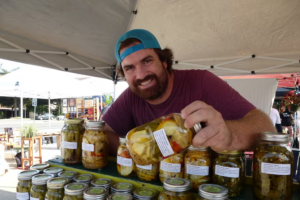Opinion: Cottage Food Regulations
Texas must step out of the kitchen and let people work
Cottage food regulations limit economic freedom for no health benefit.
By Judith McGeary and Samuel Hooper
In 2019, Bobby Bever introduced his family's Highway 19 Produce and Berries pickled squash, one of their first jarred products available, at the White Rock Farmers Market. (Photo: Kim Pierce)
-------
Testimony poured in when Texas lawmakers debated economic opportunity for home bakers and small farmers in 2023. More than 650 people wrote statements of support, filling 111 pages.
The cries for change came from every corner of the state. Melissa Taylor stays home with her special-needs daughter in Robstown, near Corpus Christi. Keisha Robinson makes allergy-friendly food in El Paso. Joel Hutton is a veteran and new farmer in Mount Pleasant. Karen Severn is a farmer in Cisco. Laura Mullen is a backyard gardener and beekeeper in Houston. And Jessica Santana is a military wife in St. Hedwig, near Austin, trying to support her family during her husband’s deployment.
None of these people is asking for a handout. They just want permission to work in their own kitchens with fewer restrictions on what, where and how much they can sell.
Texas passed a law in 2011 permitting the sale of “cottage food,” which refers to food prepared for sale in a home kitchen. In the years that followed — as doomsday predictions failed to materialize — state lawmakers gradually eased the rules.
Yet heavy restrictions remain. Cottage food producers cannot sell pumpkin pie, cheese bread or anything that requires refrigeration. They cannot sell their products at neighborhood coffee shops or mom-and-pop grocery stores. They cannot use home delivery services or any third-party vendor. Farmers cannot even sell through their own co-ops. And no cottage food producer can gross more than $50,000 annually, a fixed amount that does not keep pace with inflation.
To make matters worse, local health officials enforce their own rules and charge additional fees. The result is a patchwork of regulations across Texas, the very thing state lawmakers have tried to avoid. The law is clear: “A local government authority, including a local health department, may not regulate the production of food at a cottage food production operation.”
Undeterred, local health officials have latched onto the word “production,” and started regulating sales instead. The parsing of the law is cynical. Cottage food producers in restricted zones can bake as many pies and cookies as they want, but not collect money without paying fees to local agencies.
Our organizations, the Farm and Ranch Freedom Alliance and the Institute for Justice, track cottage food laws closely. Public records show no confirmed cases of foodborne illness from cottage food in states with the most permissive laws, and we know of no confirmed cases in Texas.
Zero. Zilch. Nada.
The data undercuts any false concern about safety, the only legitimate reason for a health department to limit a person’s right to earn an honest living or to choose what foods they buy and from whom.
As a group, cottage food producers are overwhelmingly women in lower-income households. And they tend to live in rural communities with limited economic opportunity. For many of these people, their kitchens represent hope.
“When I lost my husband in 2020, our business kept me going, both financially and emotionally,” says Mary Verock, who makes jams and jellies with her daughter-in-law in New Braunfels.
Despite the outpouring of testimony, state lawmakers failed to clear Senate Bill 829, a bipartisan measure that would have eased cottage food restrictions in 2023. The bill passed the Senate 31-0 and reached the House calendar for consideration, but opponents ran out the clock before a vote could occur.
Hundreds of families would benefit, including Olivia Kramer, a Hill Country farmer. “It is time for the state to start trusting consumers to make their own decisions regarding what foods they can buy for themselves,” she wrote.
Food brings people together, builds community and creates opportunity. Texas should step out of private kitchens and let people work.
Judith McGeary is executive director of the Farm and Ranch Freedom Alliance in Cameron, Texas. Samuel Hooper is a legislative attorney at the Institute for Justice in Austin.
###
Story originally appeared on January 30, 2025 at DallasMorningNews.com.
